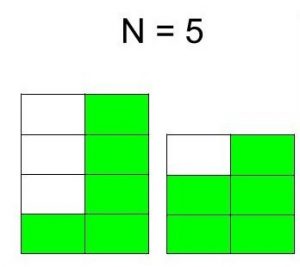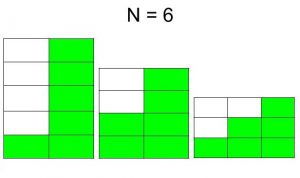Total number of different staircase that can made from N boxes
Given N boxes each of unit dimension i.e. (1×1 ). The task is to find the total number of different staircases that can be made from those boxes with the following rules:
Staircase must be in strictly descending order.
Each staircase contains at least two steps. (Total steps is equal to the breadth of the staircase.)
Examples:
Input : N = 5 Output : 2 The two staircase are following :

Input : N = 6 Output : 3 The three staircase are following :
If we consider total steps = 2, we can observe the fact that the number of staircase is incremented by 1 if N is incremented by 2. We can illustrate the above thing from the following image :

Now, if total steps is greater than 2 (assume, total steps = K) then we can take this thing as first create a base (base requires boxes equal to the total steps) for staircase and put another staircase on it of steps size K and K – 1 having boxes N – K. (because K boxes already used to create base). Thus, we can solve this problem using bottom-up dynamic programming.
public class Solution {
public int countStaircases(int N) {
// dp[i][j] -> number of stair cases possible with i bricks which has j
// width(steps)
int[][] dp = new int[N][N];
// Base case
dp[3][2] = dp[4][2] = 1;
for (int i = 5; i <= N; i++) {
for (int j = 2; j <= i; j++) {
// When step is equal to 2
if (j == 2)
dp[i][j] = dp[i - j][j] + 1;
// When step is greater than 2
else
dp[i][j] = dp[i - j][j] + dp[i - j][j - 1];
}
}
int answer = 0;
for (int i = 1; i <= N; i++)
answer = answer + dp[N][i];
return answer;
}
}Last updated
